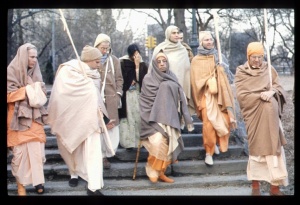SB 12.3.23: Difference between revisions
m (1 revision(s)) |
(Vanibot #0054 edit - transform synonyms into clickable links, which search similar occurrences) |
||
| (One intermediate revision by one other user not shown) | |||
| Line 1: | Line 1: | ||
{{info | {{info | ||
|speaker= | |speaker=Śukadeva Gosvāmī | ||
|listener=King | |listener=King Parīkṣit | ||
}} | }} | ||
[[Category:Srimad-Bhagavatam - Canto 12 Chapter 03]] | |||
[[Category:Bhagavatam Verses Spoken by Sukadeva Gosvami - Vanisource|120323]] | |||
<div style="float:left">'''[[Srimad-Bhagavatam]] - [[SB 12|Twelfth Canto]] - [[SB 12.3: The Bhumi-gita|Chapter 3: The Bhūmi-gītā]]'''</div> | |||
<div style="float:right">[[File:Go-previous.png|link=SB 12.3.22]] '''[[SB 12.3.22]] - [[SB 12.3.24]]''' [[File:Go-next.png|link=SB 12.3.24]]</div> | |||
{{RandomImage}} | |||
{{SBnotice}} | |||
==== TEXT 23 ==== | ==== TEXT 23 ==== | ||
<div | <div class="verse"> | ||
yaśasvino mahā-śīlāḥ | :yaśasvino mahā-śīlāḥ | ||
svādhyāyādhyayane ratāḥ | :svādhyāyādhyayane ratāḥ | ||
ādhyāḥ kuṭumbino hṛṣṭā | :ādhyāḥ kuṭumbino hṛṣṭā | ||
varṇāḥ kṣatra-dvijottarāḥ | :varṇāḥ kṣatra-dvijottarāḥ | ||
</div> | </div> | ||
| Line 17: | Line 22: | ||
==== SYNONYMS ==== | ==== SYNONYMS ==== | ||
<div | <div class="synonyms"> | ||
''[//vanipedia.org/wiki/Special:VaniSearch?s=yaśasvinaḥ&tab=syno_o&ds=1 yaśasvinaḥ]'' — eager for glory; ''[//vanipedia.org/wiki/Special:VaniSearch?s=mahā&tab=syno_o&ds=1 mahā]-[//vanipedia.org/wiki/Special:VaniSearch?s=śīlāḥ&tab=syno_o&ds=1 śīlāḥ]'' — noble; ''[//vanipedia.org/wiki/Special:VaniSearch?s=svādhyāya&tab=syno_o&ds=1 svādhyāya]-[//vanipedia.org/wiki/Special:VaniSearch?s=adhyayane&tab=syno_o&ds=1 adhyayane]'' — in study of the Vedic literature; ''[//vanipedia.org/wiki/Special:VaniSearch?s=ratāḥ&tab=syno_o&ds=1 ratāḥ]'' — absorbed; ''[//vanipedia.org/wiki/Special:VaniSearch?s=āḍhyāḥ&tab=syno_o&ds=1 āḍhyāḥ]'' — endowed with opulence; ''[//vanipedia.org/wiki/Special:VaniSearch?s=kuṭumbinaḥ&tab=syno_o&ds=1 kuṭumbinaḥ]'' — having large families; ''[//vanipedia.org/wiki/Special:VaniSearch?s=hṛṣṭāḥ&tab=syno_o&ds=1 hṛṣṭāḥ]'' — joyful; ''[//vanipedia.org/wiki/Special:VaniSearch?s=varṇāḥ&tab=syno_o&ds=1 varṇāḥ]'' — the four classes of society; ''[//vanipedia.org/wiki/Special:VaniSearch?s=kṣatra&tab=syno_o&ds=1 kṣatra]-[//vanipedia.org/wiki/Special:VaniSearch?s=dvija&tab=syno_o&ds=1 dvija]-[//vanipedia.org/wiki/Special:VaniSearch?s=uttarāḥ&tab=syno_o&ds=1 uttarāḥ]'' — represented mostly by the ''kṣatriyas'' and ''brāhmaṇas''. | |||
</div> | </div> | ||
{{SBcollapse}} | |||
==== TRANSLATION ==== | ==== TRANSLATION ==== | ||
<div | <div class="translation"> | ||
In the Dvāpara age people are interested in glory and are very noble. They devote themselves to the study of the Vedas, possess great opulence, support large families and enjoy life with vigor. Of the four classes, the kṣatriyas and brāhmaṇas are most numerous. | In the Dvāpara age people are interested in glory and are very noble. They devote themselves to the study of the Vedas, possess great opulence, support large families and enjoy life with vigor. Of the four classes, the kṣatriyas and brāhmaṇas are most numerous. | ||
</div> | </div> | ||
__NOTOC__ | </div> | ||
</div> | |||
<div style="float:right">[[File:Go-previous.png|link=SB 12.3.22]] '''[[SB 12.3.22]] - [[SB 12.3.24]]''' [[File:Go-next.png|link=SB 12.3.24]]</div> | |||
__NOTOC__ | |||
__NOEDITSECTION__ | |||
Latest revision as of 21:03, 17 February 2024

A.C. Bhaktivedanta Swami Prabhupada
Please note: The synonyms, translation and purport of this verse were composed by disciples of Śrīla Prabhupāda
TEXT 23
- yaśasvino mahā-śīlāḥ
- svādhyāyādhyayane ratāḥ
- ādhyāḥ kuṭumbino hṛṣṭā
- varṇāḥ kṣatra-dvijottarāḥ
SYNONYMS
yaśasvinaḥ — eager for glory; mahā-śīlāḥ — noble; svādhyāya-adhyayane — in study of the Vedic literature; ratāḥ — absorbed; āḍhyāḥ — endowed with opulence; kuṭumbinaḥ — having large families; hṛṣṭāḥ — joyful; varṇāḥ — the four classes of society; kṣatra-dvija-uttarāḥ — represented mostly by the kṣatriyas and brāhmaṇas.
Translation and purport composed by disciples of Śrīla Prabhupāda
TRANSLATION
In the Dvāpara age people are interested in glory and are very noble. They devote themselves to the study of the Vedas, possess great opulence, support large families and enjoy life with vigor. Of the four classes, the kṣatriyas and brāhmaṇas are most numerous.